| Srl | Item |
| 1 |
ID:
155704
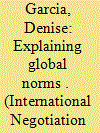

|
|
|
|
|
| Summary/Abstract |
International norms are central to world politics and they set boundaries for what is deemed commonly accepted behavior. The literature has not effectively explained the rise of new norms through negotiation and how actors from the Global South have played active roles, especially in the complex areas of developing security norms. This article argues that norm-making is not a unidirectional movement or phenomenon, but rather a highly circuitous process. The circuitous norm building model accounts for an increasing connectedness among domestic and regional/international levels in norm building in Global South and North countries.
|
|
|
|
|
|
|
|
|
|
|
|
|
|
|
|
| 2 |
ID:
155709
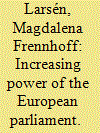

|
|
|
|
|
| Summary/Abstract |
Since the Lisbon Treaty increased the legal role of the European Parliament (EP) in EU trade policy, there has been a debate about the extent to which these legal competencies have translated into actual influence over the content and outcome of EU trade negotiations. Using the trade negotiations between the EU and India as a case study, this article argues that the impact of the EP has indeed been significant. Through two-level game analysis, which extends its domestic focus to include the EP as a domestic constituent, it demonstrates how the EP has affected the EU win-set in ways that have both hindered and facilitated agreement at the international level between the EU and India. It also shows how the EP has affected the negotiating dynamics and how the EU negotiators have had their preferences somewhat compromised by the EP in their attempt at reaching an agreement with India.
|
|
|
|
|
|
|
|
|
|
|
|
|
|
|
|
| 3 |
ID:
155711


|
|
|
|
|
| Summary/Abstract |
The dispute between India and Pakistan over Kashmir is one of the world’s most protracted and potentially dangerous conflicts. While the international community has strong interest in limiting violent conflagration between the two states, third party action aimed at amelioration has been very limited. This contrasts with overall global mediation efforts, which have increased in the post-Cold War period. Using archival research, this study explores the reasons for the Government of India’s implacable opposition to any external intervention in the conflict. We argue that both strategic and ideational motivations have influenced its decisions. In particular, India’s strict adherence to the principle of strategic autonomy precludes the possibility of accepting external mediation. By exploring how and why strategic and ideational motivations intersect to become a formidable barrier to third party intervention, this article contributes to our understanding of why certain countries develop resistance to mediation.
|
|
|
|
|
|
|
|
|
|
|
|
|
|
|
|
| 4 |
ID:
155702
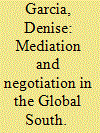

|
|
|
|
|
| Summary/Abstract |
The practice of international mediation is widely recognized as essential for international peace and security, and its advantages have been extensively acknowledged. It is also an integral component of international negotiation and the peaceful settlement of disputes. Nevertheless, most of the governmental and non-governmental actors involved in international mediation processes come from predominantly Northern countries. Very few states and civil society institutions from the Global South are engaged in international mediation initiatives or have invested in improving their national mediation capacities. Looking into the future, the involvement of the South in these efforts is needed more than ever. World leaders, from the North and the Global South need to revitalize principled commitments and allow great negotiators to come to the fore to reverse deadlocked and perilous situations in the search for peace and prosperity.
|
|
|
|
|
|
|
|
|
|
|
|
|
|
|
|
| 5 |
ID:
155707
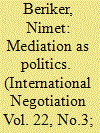

|
|
|
|
|
| Summary/Abstract |
This study proposes a conceptual model that depicts middle power mediation as a foreign policy strategy in the context of asymmetric alliance dynamics. It expands on Touval’s (2003) mediation-as-foreign policy perspective and argues that once mediation is conceived of as a viable political option in the conduct of foreign policy, engaging in mediation activity enables middle powers to create an extra space of political power not otherwise available. The article introduces an analytical model that explains the dynamics of mediation-as-foreign policy approach and the mechanisms that translate mediation engagement into political leverage. The analysis focuses on aspects of Turkish mediation efforts between 2002 and 2009 in the context of Turkish-US/EU relations.
|
|
|
|
|
|
|
|
|
|
|
|
|
|
|
|
| 6 |
ID:
155705
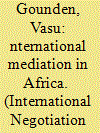

|
|
|
|
|
| Summary/Abstract |
Although informal and traditionally driven practices of mediation have existed for many generations, institutionalized and African-driven mediation became more important following the end of the Cold War. Mediation initiatives undertaken over the past 25 years, partly as a consequence of the increase in intra-state conflicts on the continent, have resulted in the generation of a deep body of knowledge and the evolution of a community of practitioners. This article examines two of the first post-1990 African-driven mediation processes – the Arusha Peace Process for Burundi and the Inter-Congolese Dialogue (ICD) for the Democratic Republic of the Congo (DRC) – to highlight key lessons that emerged, including the choice of mediator, who to include in the mediation, the impact of regional and international dynamics on the mediation, the importance and challenges of addressing the root causes of the conflict in a mediation process, and the role of non-state actors and Track II diplomacy.
|
|
|
|
|
|
|
|
|
|
|
|
|
|
|
|
| 7 |
ID:
155712
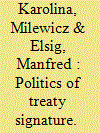

|
|
|
|
|
| Summary/Abstract |
The literature on international cooperation through legal commitments focuses chiefly on treaty ratification. What has received much less attention is that before states ratify treaties, they commit to treaties through the act of signature. This article addresses this research gap by investigating how a state’s decision to sign a treaty is affected by its diplomatic representation during treaty negotiations. Conceptualizing signature as a commitment step, we argue that participation in treaty negotiations translates into a “ties-that-bind” effect creating incentives for diplomats to support the treaty text leading to treaty signature. Our empirical analysis uses a new data set on signature and tests the argument for 52 multilateral treaties concluded between 1990 and 2005. Results confirm that participation in treaty making matters for signature but not necessarily for ratification.
|
|
|
|
|
|
|
|
|
|
|
|
|
|
|
|
| 8 |
ID:
155708
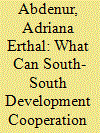

|
|
|
|
|
| Summary/Abstract |
Until it began waning due to economic crisis and political turmoil on the domestic front, in Brazil’s rapidly expanding South-South development, cooperation often has been promoted by government officials as contributing to stability and prosperity in partner states. It is unclear, however, how this development cooperation intersects with the country’s involvement in UN peace operations. This article examines the role of Brazilian South-South technical cooperation across two contexts. In Haiti, Brazil has led the military component of the MINUSTAH, whereas in Guinea-Bissau, it has helped to spearhead peacebuilding efforts by the international community. In both cases, Brazil has tried to substantiate its critique of the UN’s securitization by providing technical cooperation across a variety of sectors. The analysis shows that this cooperation is too fragmented, subject to interruptions, and disconnected from UN-led efforts to make a considerable contribution to a sustainable peace. However, better internal coordination and stronger ties to UN initiatives could boost the contribution of Brazil’s Brazilian South-South development cooperation to a lasting peace.
|
|
|
|
|
|
|
|
|
|
|
|
|
|
|
|